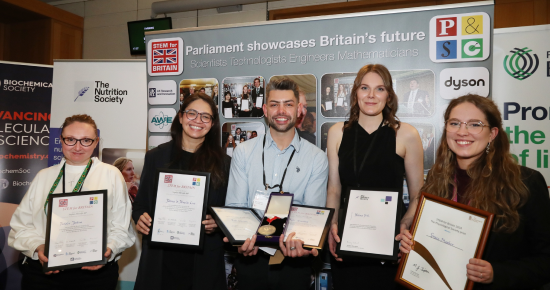News
Bioscientists win medals at Westminster’s STEM for Britain 2024
- Details
- 07 March 2024
Five bioscientists took home medals from this year’s STEM for Britain, the Parliamentary poster competition.
Researchers presented their work in Parliament to a panel of expert judges, whilst also getting the chance to talk to local MPs about their research and its applications. Over 100 bioscientists from across the UK applied to take part this year, with only 30 being selected to present their posters at the event and to be in with a chance to take home a medal.

Kyle Greenland, a PhD student at Imperial College London, won Gold in the Biological and Biomedical Sciences category for his work on the use of nanomedicines for treating cancer, and in particular, prostate cancer. The liposomal nanomedicines work by encapsulating the medication which is site-specific and works to break down the tough collagen surrounding the cancer cells, thus enabling the medication to more easily target the cancer cells. This has led to an increase in cancer cell elimination with fewer side effects.
Karina de Almeida Lins, a PhD student at the University of Nottingham, took home the Silver medal for her research surrounding improving survival in premature infants through the development of anti-biofilm feeding tubes. With 56% of neonatal deaths being attributed to hospital-acquired infections leading to lifelong disabilities, coating feeding tubes in anti-biofilm polymers has resulted in biofilm formation being reduced by up to 95% on feeding tubes.
The Bronze medal was awarded to Natalie Jenkins, a PhD student at the University of Glasgow, whose poster presentation focused on research about understanding long-term brain health consequences of intimate partner violence (IPV). It was found that being exposed to IPV earlier in life leads to problems with visuospatial tasks, memory, and thinking in mid-life, many years after the initial exposure.
The Nutrition Society Award went to Dr Helena Fisk, Research Fellow at the University of Southampton, for her research into profiling the inflammatory status of adipose tissue and evaluating the action of omega-3 fatty acids in human obesity. Reduced levels of anti-inflammatory oxylipins are a key feature of obesity, and whilst omega-3 fatty acids can increase the levels of anti-inflammatory oxylipins, this cannot be achieved in obese individuals and therefore the guideline recommended intake of omega-3 needs to be revised.
The Physiological Society Award was presented to Grace Meaker, DPhil student at the University of Oxford, for her presentation on haematopoietic stem cells, and how the use of polyvinyl-alcohol promotes their production.
Speeches included those from Stephen Metcalfe MP, Chairman of the Parliamentary and Scientific Committee; Melanie Buckley, Programme Lead at UKRI; and the Viscount Stansgate, Dr Stephen Benn FRSB. Their primary focus was on showcasing the best and brightest of British talent, whilst highlighting the importance of cross sectoral collaborations, such as between academia and industry. There was a common theme of wanting to keep the UK as a global leader in this space and to continue building a network of international collaborators. After the speeches and presentations there was ample opportunity for networking.
Well done to everyone who took part. It was fascinating to see such a range of high quality research and what is currently being achieved within the Biological and Biomedical Sciences.
STEM for Britain, organised by the Parliamentary and Scientific Committee with support from a number of learned societies including the Royal Society of Biology, is open to early career researchers engaged in scientific, engineering, technological or medical research.
For more information on STEM for Britain, visit their website or follow the event on X.

